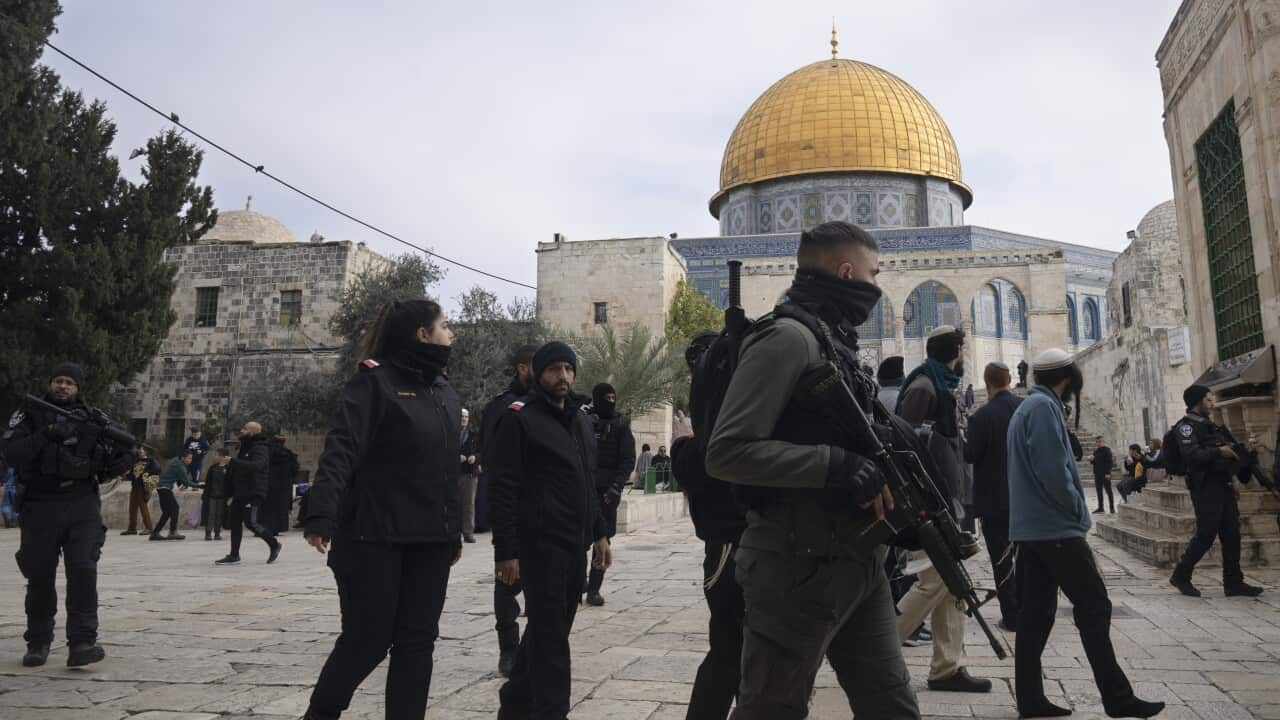KEY POINTS
- Israeli national security minister has visited the Al-Aqsa mosque compound in Jerusalem.
- In a tweet, Itamar Ben-Gvir used the Jewish name for the site, proclaiming 'the Temple Mount is open for all'.
- The move has brought swift condemnation from Palestinians and neighbouring countries.
Saudi Arabia and the United Arab Emirates were among nations to condemn a visit Tuesday by Israel's extreme-right new national security minister to Jerusalem's Al-Aqsa mosque compound.
The move by firebrand Itamar Ben-Gvir has enraged Palestinians, while the United States and Germany warned of steps which may harm the status quo.
"Our government will not surrender to the threats of Hamas," Mr Ben-Gvir vowed in a statement published by his spokesman, after the Palestinian militant group warned such a step was a "red line".
Mr Ben-Gvir's visit comes days after he took office as national security minister, with powers over the police, giving his decision to enter the highly sensitive site considerable weight.

Itamar Ben-Gvir greets supporters during a visit to Jerusalem's Mahane Yehuda market on 30 December, 2022. Source: AAP / Menahem Kahana
Under a longstanding status quo, non-Muslims can visit the site at specific times but are not allowed to pray there.
In recent years, a growing number of Jews, most of them Israeli nationalists, have covertly prayed at the compound, a development decried by Palestinians.
The UAE, which established diplomatic ties with Israel in 2020, "strongly condemned the storming of Al-Aqsa Mosque courtyard by an Israeli minister".
The US ambassador to Israel, Tom Nides, said Washington "has made it clear to the Israeli government it opposes any steps that could harm the status quo in the holy sites".

The rise of Ben-Gvir in Netanyahu's government has deepened Palestinian anger about their long-failed efforts to secure a state. Source: AAP / Maya Alleruzzo
Lying in the walled Old City of Israeli-annexed east Jerusalem, the compound is administered by Jordan's Waqf Islamic affairs council, with Israeli forces operating there and controlling access.
After his visit, Mr Ben-Gvir vowed to "maintain the freedom of movement for Muslims and Christians, but Jews will also go up to the mount, and those who make threats must be dealt with — with an iron hand".
'Serious threat'
The politician has lobbied to allow Jewish prayer in the compound, a move opposed by mainstream rabbinical authorities.
Israel's Sephardi chief rabbi, Yitzhak Yosef, wrote to Mr Ben-Gvir on Tuesday.
"What will people say when they see a minister, an observant Jew, who flouts the position of the rabbinate?" he asked.
Mr Ben-Gvir was accompanied by units of the Israeli security forces, Waqf guards told AFP.
Jordan's foreign ministry spokesman Sinan Majali said Amman summoned the Israeli ambassador, to "convey a protest message about the recklessness of the Israeli national security minister in storming the blessed Al-Aqsa mosque".
Saudi Arabia, home to the holiest sites in Islam, condemned the "provocative practices" of Mr Ben-Gvir.
And Israel's arch-foe Iran called the visit a "violation of international regulations and an insult to the values and sanctities of the Muslims," with a foreign ministry spokesman warning of a response from "Muslim nations".
While Mr Ben-Gvir has visited the compound numerous times since entering parliament in April 2021, his presence as a top minister is highly significant.
A controversial visit in 2000 by then opposition leader Ariel Sharon was one of the main triggers for the second Palestinian intifada, or uprising, which lasted until 2005.
The Palestinian foreign ministry called Mr Ben-Gvir's visit a "serious threat".
Basem Naim, a senior Hamas official, last week warned such a step would be "a big red line and it will lead to an explosion".
On Tuesday, Hamas spokesman Hazem Qassem deemed it a "crime" and vowed the mosque compound "will remain Palestinian, Arab, Islamic".









